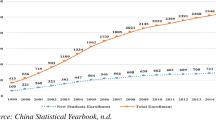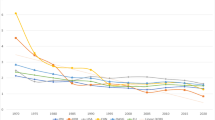Abstract
This paper used the results of a research project that was implemented at the Institute for Social Analysis and Forecasting of the Russian Academy of National Economy and State Service under the President of the Russian Federation in 2015. The data of the quantitative survey of school graduates from the 11th grade of secondary schools in small Russian towns, as well as the materials of expert interviews with representatives of the municipal education departments and school management. The main conclusion of the study is that there is a huge migration potential of youth in small towns, which is mainly related to receiving higher education in large cities, unfortunately without the real prospect of returning to the lesser motherland.
Similar content being viewed by others
References
M. S. Cherkasova, “Professional plans of school graduates in the context of the situation at the regional labor market,” Diskussiya, No. 2 (54), pp. 107–112 (2015).
W. M. Minza, “Young migrants and education-to-work transitions in Pontianak, West Kalimantan,” Asia Pac. J. Anthropol. 13 (1), 64–75 (2012).
N. V. Mkrtchyan, “The effect of migration on the age structure of the population of the regions, cities, and districts of Russia,” in Proceedings of the Institute of Economic Forecasting of the Russian Academy of Sciences (MAKS Press, Moscow, 2014), pp. 381–396 [in Russian].
N. V. Mkrtchyan, “Migration of young people to regional centers of russia at the end of the 20th and the beginning of the 21st centuries,” Reg. Res. Russ. 3 (4), 335–347 (2013).
I. Kashnitsky, “Migration of youths in Russia: Impact on sex-age structures,” Mediterr. J. Soc. Sci. 4 (10), 358–365 (2013).
N. Zago, “Migração rural-urbana, juventude e ensino superior,” Rev. Bras. Educ. 21 (64), 61–78 (2016).
M. N. Vandyshev, “The potential mobility of graduates of schools of small and medium-sized cities of the Sverdlovsk oblast,” Monit Obshchestv. Mneniya: Ekon. Sots. Peremeny, No. 5 (123), 114–124 (2014).
K. A. Chernyshev, Modern problems of youth migration in the Kirov oblast, Reg. Ekon.: Teor. Prakt., No. 48 (375), 48–58 (2014).
E. Ya. Varshavskaya and O. S. Chudinovskikh, “Migration plans of graduates of regional universities of Russia,” Vestn. Mosk. Univ., Ser. 6 Ekon., No. 3, 36–58 (2014).
S. Tano, “Regional clustering of human capital: School grades and migration of university graduates,” Ann. Reg. Sci. 52 (2), 561–581 (2014).
C. Perret, “Les régions françaises face aux migrations des diplômés de l’enseignement supérieur entrant sur le marché du travail,” Ann. Geogr. 117 (662), 62–84 (2008).
Yu. F. Florinskaya and T. G. Roshchina, “Estimating the migratory mobility of the youth living in small Russian towns: A school Leavers’ interview,” Stud. Russ. Econ. Dev. 19 (3), 300–310 (2008).
Yu. Florinskaya and T. Roshchina, “Life plans of school graduates in small cities,” Chelovek, No. 5 (2005).
T. Nefedova, “Seasonal work in the migration system of post-Soviet Russia,” Demoskop-Weekly, May, 641–642 (2015). http://www.demoscope.ru/weekly/2015/0641/tema01.php.
T. G. Nefedova, “Migration attractiveness of cities as an indicator of the transformation of post-Soviet Russia’s urban space,” in Science, Innovation, Technologies (Tekhnol., Severo-Kavk. Fed. Univ., 2014), pp. 106–136 [in Russian].
N. V. Mkrtchyan, “Migration of young people to Russian regional centers at the end of 20th—beginning of the 21st century,” Izv. Ross. Akad. Nauk, Ser. Geogr., No. 6, 19–30 (2013).
Income, Expenditure, and Consumption of Households in 2014 (Rosstat, Moscow, 2015) [in Russian]. http://www.gks.ru/wps/wcm/connect/rosstat_main/rosstat/ru/statistics/publications/catalog/doc_1140096812812.
Yu. Florinskaya, “The impact of material situation and housing conditions on the population mobility in Russia,” Stud. Russ. Econ. Dev. 19 (6), 655–665 (2008).
T. L. Klyachko, Financing the higher education system in Russia: Main problems (2014). http:// www.fa.ru/chair/fin/research/Documents/D0 A4 D0 B8 D0 BD D0 B0 D0 BD D1 81 D0 B8 D1 80 D0 BE D0 B2 D0 B0 D0 BD D0 B8 D0 B5 20 D1 81 D0 B8 D1 81 D1 82 D0 B5 D0 BC D1 8B 20 D0 92 D0 9E.pdf.
Author information
Authors and Affiliations
Corresponding author
Additional information
Original Russian Text © Yu.F. Florinskaya, 2017.
Rights and permissions
About this article
Cite this article
Florinskaya, Y.F. School graduates from small towns in Russia: Educational and migration strategies. Stud. Russ. Econ. Dev. 28, 87–96 (2017). https://doi.org/10.1134/S1075700717010038
Received:
Published:
Issue Date:
DOI: https://doi.org/10.1134/S1075700717010038




